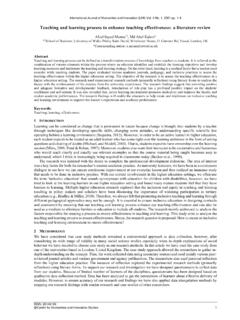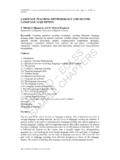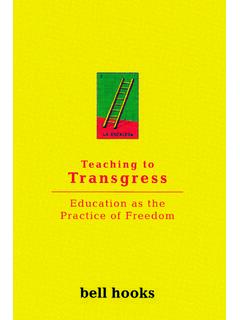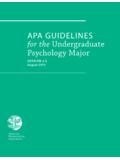Transcription of Intercultural Communication Challenges and Strategies for ...
1 PASAA Volume 59 January - June 2020 Intercultural Communication Challenges and Strategies for the Thai Undergraduate Hotel Interns Anyada Jhaiyanuntana Singhanat Nomnian* Research Institute for Languages and Cultures of Asia, Mahidol University, Salaya, Nakhon Pathom, 73170 Thailand E-mail: Abstract The hospitality industry is one of Thailand s most important sectors that contributes to the national economy. Human capital has become so vital that a strong foundation and development of undergraduate students in this discipline are needed. Their internship experience is part of the process of learning and integrating their knowledge into practice, especially concerning Intercultural communicative encounters.
2 There are, however, few studies related to this particular issue. This research aims to study Thai undergraduate hotel interns Intercultural Communication Challenges and Strategies while undertaking their internship at an in-house hotel training center located on a university campus. Drawing upon a mixed-method approach based on questionnaires and semi-structured interviews, the results based on calculated mean scores suggest that the interns ranked five Intercultural communicative Strategies from highest to lowest as follows: (i) critical cultural awareness (x = ), (ii) attitudes (x = ), (iii) knowledge (x = ), (iv) skills to interpret and relate (x = ), and (v) skills to discover and interact (x = ).
3 This study suggests that academic programs should equip Thai undergraduate hotel interns with proficiency in foreign languages and cultures, problem-solving skills, and cross-cultural and interpersonal PASAA Vol. 59 January - June 2020 | 205 understanding. This study contributes to awareness and the need to incorporate Intercultural communicative competence into the hospitality programs that can produce graduates who are well-equipped and prepared for multilingual and multicultural working environments. Keywords: Internship, Intercultural Communicative Competence (ICC), Intercultural Communication Challenges , Communicative Strategies , Hospitality Industry Introduction Globalization increases the mobility of foreign tourists to cross borders for business and leisure purposes through which languages and cultures are inevitably exchanged and Challenges arise in Intercultural communicative encounters (Thurlow & Jarwoski, 2010).
4 English has long been considered as a vehicular language for the hospitality industry as it is commonly used among hotel professionals and international tourists. It has recently gained its lingua franca status within ASEAN in Charter Number 34 where workers in the hospitality industry are required to communicate in English effectively to meet the increasing demand of the hotel and tourism sectors. The hospitality industry is one of the income-generating sectors of the Thai economy since inbound tourism in Thailand attracts a considerable number of foreign tourists, who are generally and warmly welcomed and impressed by the services this industry offers them (Office of the National Economics and Social Development Board, 2017).
5 Nomnian (2014a, b) states that effective Intercultural Communication helps business owners and employees to provide quality services and create positive attitudes on the part of visitors. However, besides English proficiency, Phumpho and Nomnian (2019) claim that Communication Challenges between Thai business people and their ASEAN counterparts remain due to the lack of cultural knowledge and awareness, and factors such as indirectness and subtlety, which may hinder effective business Communication . Personnel working in the Thai hospitality industry need to be trained and equipped 206 | PASAA Vol.
6 59 January - June 2020 with interpersonal and Intercultural Communication skills as part of their academic course and during their internship period to become fully competent. Studies in Intercultural Communication have been well-documented and disseminated due to the growing interest of scholars in the multidisciplinary fields of hotel and tourism, applied linguistics, and Communication studies (Deardoff, 2006; Gibson & Zhong, 2005). The findings of Hsu et al. s (2017) meta-analysis study on hospitality and tourism education from 2005-2014 reveal that the main topics of previous studies included teaching and learning, student development, curricula and programs, education environment and faculty development.
7 Research on the topic of hotel undergraduate students internship was relatively under-explored despite the fact that it is crucial in order for students to be prepared and cultivated with authentic hands-on experience for effective performative outcomes (Shapero & Collegium, 2006; Sinicrope et al., 2007; Suebwongsuwan & Nomnian, 2020). It is evident that Intercultural Communication deals with cultural awareness, sensitivity and understanding of cultural differences should be perceived as a critical issue in the hospitality industry in terms of Challenges and Strategies , which can develop Intercultural competence among tourism and hospitality students to interact and opearte effectively in multicultural and multilingual settings (Grobella, 2015).
8 In Thai higher education context, Dhevabanchachai and Wattanacharoensil (2017) confirm the essential role of compulsory in-house internship plays within the Tourism and Hospitality Management curriculum, which potentially equip and prepare students through the genuine internship experience. The objective of this study is to explore the Intercultural Communication Challenges and Strategies employed by Thai undergraduate students who have undergone in-house internship at a hotel training center as part of their academic requirements.
9 The results hope to shed light on the hospitality program that aims to equip students with Intercultural communicative PASAA Vol. 59 January - June 2020 | 207 competence that is relevant and applicable for their future as hotel professionals. Review of Literature Intercultural Communicative Competence: Definitions and Model Intercultural communicative competence (ICC hereafter) has been variously defined. Byram (1997) views ICC as the term that covers key components, including linguistic competence, sociolinguistic competence, discourse competence, and Intercultural competence, which enable individuals to interact with others who are from different linguistic and cultural backgrounds.
10 Likewise, Chen and Starosta (1996) define ICC as speakers abilities and competencies, namely Intercultural sensitivity (affective process), Intercultural awareness (cognitive process), and Intercultural adroitness (behavioral process), which are vital for effective and appropriate Communication in a culturally diverse community. L z r et al. (2007), similarly state that ICC is composed of speakers skills and attitudes with respect to communicating in various cross-cultural situations. To sum up, ICC can be viewed as speakers communicative abilities, competences, skills, and attitudes towards other interlocutors with regard to their linguistic and cultural identities in multilingual and multicultural contexts.














